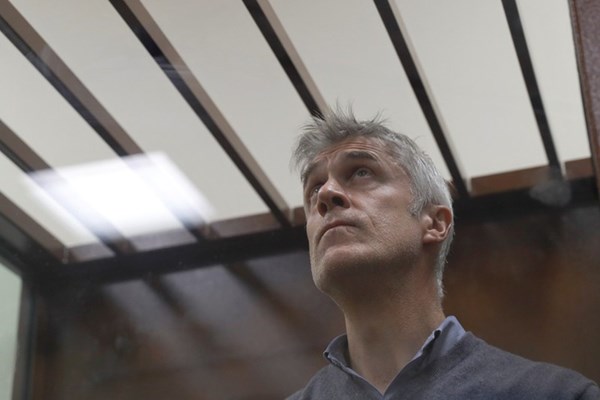Russia’s biggest American investor placed under 2 month arrest in Moscow
Russia’s legal system continues to dampen the country’s already troubled investment climate.
Michael Calvey, founder of Baring Vostok, the largest direct investment fund in Russia with more than 80 projects and $3 billion in capital invested in the Russian economy, was arrested by the Basmanny District Court of Moscow on Saturday and sent to a pre-trial detention center for two months.
A graduate of the University of Oklahoma and the London School of Economics and Political Science, Calvey came to Russia in 1994 and founded one of the first investment funds in the country after the dissolution of the USSR. The fund has invested in diverse projects such as Yandex, STS-Media, and even GettTaxi and the PapaJones pizzeria network, avoiding only one thing – businesses connected to the government.
The government itself came after Calvey in the form of Judge Artur Karpov, who dispatched the US citizen to the Lefortovo pre-trial detention center until 13 April, satisfying the petition of Russia’s Investigative Committee, which suspects Calvey of embezzling 2.5 billion rubles (around $38 million) from Vostochny Bank. Calvey’s fund, Baring Vostok, is the controlling shareholder of Vostochny Bank with 51.6% ownership.
According to the investigation, Calvey’s First Collector Bureau owed Vostochny Bank 2.5 billion rubles, and repaid the debt by means of shares in the Luxembourg-based Financial Technology Group at a deliberately inflated price. The investigators believe that the real value of the shares is no more than 600,000 rubles, and “tending toward zero”, according to Russia’s Central Bank.
Calvey, who chose to remain in Russia even after the 1998 default, the 2008 crisis, the annexation of Crimea and the start of the sanction war with the West, may be leaving the scene due to a conflict with Artem Avetisyan. The former owner of Yuniastrum Bank, which merged with Vostochny, Avetisyan is also the director of new business at the Strategic Initiatives Agency and a member of the interdepartmental group to protect business owners’ rights.
Avetisyan and Sherzod Yusupov, another minority shareholder in Vostochny, gave testimonies against Calvey, claiming that he deceived the other partners in the deal.
These charges are clearly a response to proceedings initiated by Baring against Avetisyan at the London Court of International Arbitration, Calvey explained from within a glass cell in the Basmanny court building, where he was transferred after a night in an isolation cell.
“Before the merger of Yuniastrum Bank and Vostochny, Artem Avetisyan withdrew significant sums from the bank he controlled through fictitious deals – they bought a mushroom farm, a canning plant and so on. We were preparing for the merger and could not control these deals,” TASS cites Calvey as saying.
According to Calvey, Sherzod Yusupov, who filed the case at the FSB, had two motives: to establish a better bargaining position to get Baring to withdraw its demands at the London court, and to reduce the dilution of Avetisyan’s share in Vostochny Bank, which was unavoidable due to its recapitalization.
Vostochny Bank acquired all of Yuniastrum’s old assets, and as a result, Central Bank ordered Vostochny to create an additional financial cushion of around 20 billion rubles. “Mr Avetisyan and I took on the responsibility to increase the bank’s capital. In November 2018, Avetisyan thought he could participate in the recapitalization of the bank, but now it is clear that he has insufficient funds for this,” Calvey added.
“This is an incorrect assessment of shares, and is absolutely an economic dispute which should be dealt with under civil law. Criminal law has absolutely nothing to do with this,” said business ombudsman Boris Titov in a comment on the situation.
“Such a reaction by the law enforcement organs is, of course, a very powerful signal to foreign investors, and the signal will be taken into account immediately,” Titov emphasized.
Both Kirill Dmitriev, who runs Russia’s Direct Investment Fund, and Sberbank CEO Herman Gref offered to vouch for Calvey, so that he would only be placed under house arrest, but to no avail.
Calvey has been charged with fraud on an especially large scale, and could face 6 years in prison if convicted.
Kremlin spokesperson Dmitry Peskov said that President Vladimir Putin has been informed about the situation.
